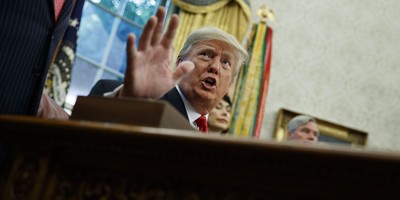During a town hall meeting in the eastern city of Chelm Sunday, Polish Prime Minister Mateusz Morawiecki urged the Polish people to refrain from using language that could be considered anti-Semitic.
“I would like every one of you to contribute to positive thinking,” he said, “to avoid anti-Semitic statements, because they are grist to the mill for our enemies, for our adversaries.”
"Let’s avoid it like the plague," Morawiecki said, "even the dumb, unnecessary jokes. Most importantly, let’s all explain together how things really were."
His comments are in reference to the controversial Holocaust law which criminalizes anyone who implies Poland participated in or was responsible for Nazi crimes during the Second World War.
According to the law, those convicted could face up to three years imprisonment.
The text of the law states: "Whoever claims, publically and contrary to the facts, that the Polish Nation or the Republic of Poland is responsible or co-responsible for Nazi crimes committed by the Third Reich… or for other felonies that constitute crimes against peace, crimes against humanity or war crimes, or whoever otherwise grossly diminishes the responsibility of the true perpetrators of said crimes – shall be liable to a fine or imprisonment of up to three years."
However, Human Rights Watch and other critics have voiced concern that the law could potentially curb free speech and be detrimental to any form of discussion about the nation’s history.
Recommended
“Laws that criminalize historical discussion – whether denial of, or responsibility for, genocide – have a chilling effect on free expression even if no one is prosecuted for them,” Human Rights Watch stated.
“Rather than criminalizing discussion of these awful crimes, the government should seek to create an environment for public debate to thrive, in which fact-based arguments can be presented and exchanged without fear of reprisal,” they added.
The Helsinki Foundation for Human Rights also criticized the law by stating that because of the risk attached, it discourages the public from freely exchanging ideas about Poland’s history.
“The HFHR argues that, if adopted, the proposed version of the Act may discourage members of the public from discussing certain aspects of Poland’s history because of the risk of facing criminal sanctions” they explain.
“Similar laws enacted in foreign jurisdictions such as Turkey or Italy have been repeatedly criticised by international human rights organizations,” HFHR added. “The UN Human Rights Committee has expressed concerns over the planned introduction of such laws in Poland, as soon as such intention was announced. The experiences of other countries where similar laws were enacted, and especially Turkey, show that such legal measures have been abused in attempts to prosecute writers, journalists or editors and other participants in public debate, whose statements were recognised as unfavourable or cumbersome from the ruling political forces’ perspective.”
However, after signing the controversial bill into law Tuesday, Polish President Andrjez Duda clarified that he wishes the law to be amended after it is thoroughly examined by Poland’s constitutional court to ensure it meets the conditions of the nation’s constitution and that it will not detract from an individual’s freedom of speech and expression.
In a statement January 27, Israeli Prime Minister Benjamin Netanyahu expressed concern over the initial drafting of the law, calling it “baseless.”
“The law is baseless; I strongly oppose it,” he said. “One cannot change history and the Holocaust cannot be denied. I have instructed the Israeli Ambassador to Poland to meet with the Polish Prime Minister this evening and express to him my strong position against the law.”

























Join the conversation as a VIP Member